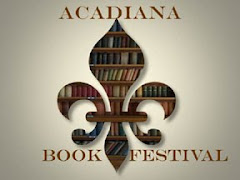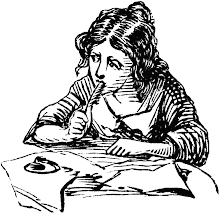I recently read somewhere to only write what you know and if you don't know about it, read about it. I once attended the Louisiana Book Festival in Baton Rouge and had the chance to ask Pulitzer Prize-winner Rick Bragg how one would know if a story is worth writing, and of course, eventually reading. He told me with all seriousness that if it means anything to me at all, then yes, it is most certainly worth it. I am determined to milk his reply for all it's worth. This is my journey. The ups. The downs. And all of the words in between.
A Commonplace For Everything

"To those, who have been accustomed to the use of a Commonplace Book, the advantage of a convenient Repository of the kind is well known; and to those, who have not, its utility must be sufficiently obvious. The man who reads, and neglects to note down the essence of what he has read; the man who sees, and omits to record what he has seen; the man who thinks, and fails to treasure up his thoughts in some place…will often have occasion to regret an omission, which such a book, as is now offered to him, is well calculated to remedy." RENAISSANCE COMMONPLACE BOOKS FROM THE BRITISH LIBRARY
In reading Unveiling Kate Chopin by Emily Toth, I kept coming across mention of something called a Commonplace Book. I had never heard of such a thing but seeing that Kate was a writer in 1800s America, I was compelled to find out what exactly what the biographer was referring to. I find Victorian culture fascinating and being an avid scrapbooker and writer myself, I found the following explanation:
According to Wikipedia, Commonplace books were a way to compile knowledge, usually by writing information into books. They became significant in Early Modern Europe. "Commonplace" is a translation of the Latin term locus communis which means "a theme or argument of general application", such as a statement of proverbial wisdom. In this original sense, commonplace books were collections of such sayings, such as John Milton's commonplace book. Scholars have expanded this usage to include any manuscript that collects material along a common theme by an individual. Such books were essentially scrapbooks filled with items of every kind: medical recipes, quotes, letters, poems, tables of weights and measures, proverbs, prayers, legal formulas. Commonplaces were used by readers, writers, students, and humanists as an aid for remembering useful concepts or facts they had learned. Each commonplace book was unique to its creator's particular interests.
I always find myself re-reading informative passages, newspaper clippings, beautiful poems, recipes, song lyrics or excerpts from various books wondering how I would ever remember that they were there later. What better way to compile these things and perhaps leave your children something that they can cherish once you are gone than a "Commonplacer"?
According to the website Self Made Scholar, the steps for creating a Commonplace book are quite simple.
1. Choose your medium (notebook, binder, journal, blog, etc.)
2. Choose your content (include anything you would like to remember)
3. Choose an organizational system (dividers, sections, chapters, tabs, etc.)
4. Keep it up!








No comments:
Post a Comment